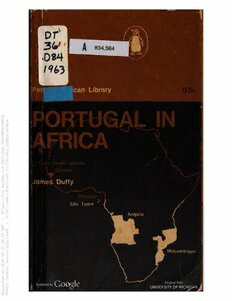
Portugal in Africa PDF
Preview Portugal in Africa
Duffy James São Tome Moçambique "ºx A vº |ENGUIN AFRICAN LIBRARY AP3 dited by Ronald Segal Portugal in Africa Fry AMEs Du JAMES Duffy Portugal in Africa Penguin Books Jy7T 34 Z) X % /743 Penguin Books Inc 33oo Clipper Mill Road, Baltimore 11, Maryland This edition first published 1963 Copyright © James Duffy, 1962 Printed in the United States of America | º Contents List of Maps Editorial Foreword Introduction I9 PART ONE THE PAST : 1 Portugal, West Africa, and Congo the 25 Angola 2 47 Moçambique 3 73 PART TWO : THE YEARS BET WEEN Discovery Diplomacy IOI 4 and 5 Promise and Disappointment 117 PART THREE THE PRESENT : 6 Theory and Reality I49 7 The Death of the Dream I9I Bibliography 23O Index 233 List of Maps I A political map of Africa, showing the situation in 1961 22 2 Portuguese Guinea, 1961 23 3 West Africa as far south as the Congo River, showing the limits of Portuguese influence c. 1500 32 4 Angola, I961 48 Moçambique, 5 1961 74 6 The limits of Portuguese influence in East and South West Africa, c. 16oo 76 7 Portuguese-controlled territory south of the equator in Africa, II2 c. 188o EDITORIAL FOREWORD he finally escaped from prison hospital to the Argentinian Embassy and was granted political asylum there. The Salazar régime does not encourage scrutiny. It is not enough that Portugal should retain her empire be cause she needs it economically; her government must claim that its rule is a service to mankind. This fantasy — that forced labour and political repression, illiteracy and starvation, are signposts ofcivilization – is one which it must be difficult for the governing families of Portugal themselves to believe. That they should expect Africans to believe it as well is grotesque. A study of Portugal in Africa, such as Professor Duffy has , here undertaken, istherefore, an urgent task not only asameas ure ofPortugal’s historic mission nAfrica, its achievements and i its devastations, but also as an examination ofdelusion itself, significant for its application othe whole contemporary world t and, nparticular, the present-day relationships between Africa i and the West. Writing on the Belgian Congo nAfrica South (July–Septem i ber 1960) Colin Legum claimed: The self-deception of Europeans n multi-racial societies s un i i doubtedly the major political problem still facing Africa. European supremacy sfirmly maintained on an elaborate structure ofpropa i ganda both intentionally and unintentionally designed oreassure the t white rulers ofthe justice oftheir cause, and oprevent the outside t world from understanding what sreally happening. i The Belgians excelled at this practice. They genuinely deceived themselves about the success oftheir own paternalist policies; they laid a massive smoke-screen that prevented a proper assesssment of the wide gaps between the claims of their policies and their actual achievements. Nobody achieved greater success inprovidingarationale for their paternalism; moral fervour and intellectual argument were harnessed to their cause. Inforcongo-the Belgian Department of Information nthe Congo-was one ofthe finest propaganda machines i nthe world; the only pity oftsthat twas notput oany better use. i ii i t But the efficiency ofBelgian propaganda was adouble-edged weapon. For the awakening came with such shattering swiftness and force that tleft the Belgians bewildered and aghast attheir own self-deception. i For Belgium the moment ofawakening came with the furious I6
